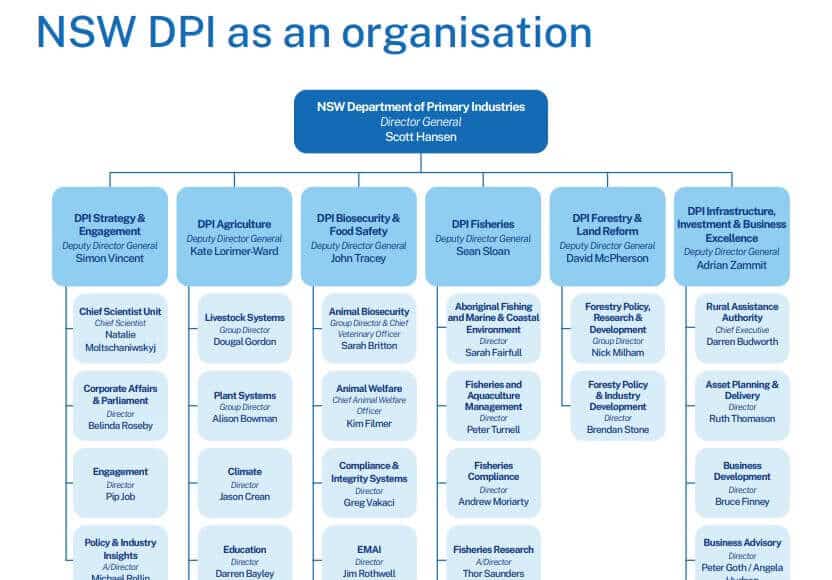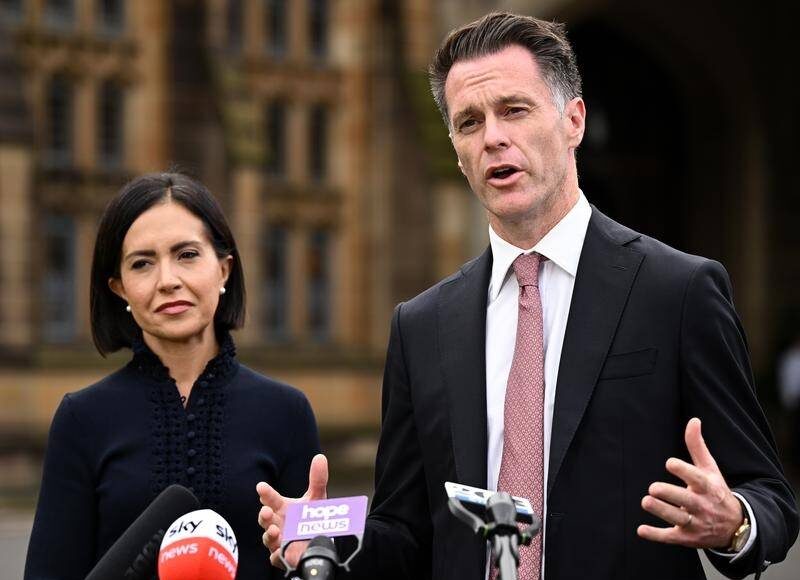Experience has shown over time that a promise from a politician is never worth the paper it is written on. But it has always been the expectation that politicians ensure the public service adheres to the government’s policies of the day.
By way of background, the NSW Department of Primary Industries (DPI) under the Administrative Orders of the Executive Council, is responsible for forestry in the state. The Administrative Order is issued each time a new ministry is sworn in, allocating each item of legislation to an individual minister.
The Forestry Act and the Local Land Services Act, although allocated to the DPI, gives the Minister for the Environment and/or Planning some responsibilities. This means the department responsible to that minister also has some carriage for native forestry in NSW. The Plantations Act also fits under DPI.
In the 2022 Agriculture Annual Report of the DPI issued in March 2023, the organisational chart reveals under the Director General Scott Hansen, a division titled ‘DPI Forestry and Land Reform’. It has within this division Forestry Policy, Research and Development under group director Nick Milham and Forestry Policy and Industry Development under director Brendan Stone.

Nick Milham has charge of the Forestry Act administration and Plantations Act administration and Brendan Stone the Local Land Services Act.
This is the only reference to forestry in the entire report.
Yet, in the calendar 2022 year being reported on, forestry experienced the aftermaths of the 2019-2020 fires and 2021 and 2022 floods in the state, both north and south.
There was a disruption to the supply of both hardwoods and softwoods. The Local Land Services Group had policy success in a new Private Native Forestry Code of Practice being issued. The softwood plantations that had been burnt in the south of the state required such major environmental work being undertaken … such that about 30% of land could not be replanted for future harvesting.
None of this was reported. Why?
In the second half of 2022, four Government Information Requests (GIPAs) were lodged with four NSW government departments. In 2019, a Cabinet Cluster Committee met and Minister Kean, then Minister for the Department of the Environment, carried the day with a decision to refer a particular forestry matter to the Office of the Chief Scientist.
The full details cannot be outlined as the matter is still ongoing. The GIPAs were lodged because no progress was made with a final decision despite continual requests from the Deputy Premier’s office as to why the delay.
The response to the GIPAs took double the time permitted under the relevant legislation. When all the departments had responded a very large spreadsheet was constructed. This work disclosed certain things.

Several very clear and indisputable facts were evident
- No single department or agency had a comprehensible GIPA process. This was clear as we could see copies of emails that were sent to one of the departments and it would be expected to see a copy of that email received in the recipient department (copy supplied). This was not the case many times.
- It became evident that one person controlled the reference to the Chief Scientist. It is well known that this individual wished to close native forestry within NSW. This person took two years to ensure the Chief Scientist commenced the reference. The files and cross-correlation of the material created the impression that nothing would have occurred if the timber industry had not contacted the Deputy Premier’s office several times.
- The matter remains unresolved despite a report from the Office of the Chief Scientist. It is now approaching four years since the Cabinet Committee made its decision and it is more than four years from when the need for a decision was recognised by sections of the NSW Public Service because of a lapsing arrangement requiring administrative renewal.
- It was clear from communications between the DPI, the Office of the Chief Scientist, the Department of the Environment, and the Forestry Corporation of NSW, the Officer from the Department of Environment held the whip hand. The other departments were either subjugated or part of the process. No one wanted to ‘rock the boat’ to achieve effective administration. It became apparent that prior working relationships mattered, not fearless advice.
What this suggests is that the DPI will not fearlessly carry out its responsibilities set out in the NSW parliament’s legislation as no politician holds them to account and that the Officer in the Department of the Environment is exceeding the authority vested in the Department by the NSW Parliament by running a private agenda.
The DPI forestry policy division is the entry point for the Forestry Corporation of NSW, a legislated state-owned corporation, into the NSW state bureaucracy for policy issues.
An ineffective or hampered advocate for forestry policy means the state’s working forests are unprotected against officers in the Department of the Environment who are ideologues and exceeding their statutory function. The result is environmental benefits and the public production of a rotational sovereign timber supply from 2% of the state-controlled land suffers.
This explains the lack of information on forestry activities in the DPI 2022 annual report.
The new ALP NSW government has made personnel changes in some departments at the top. However, the malaise is further down in most middle to upper management departments.
The media bleat is about political interference in the public service but no one wants to deal with the intense ideological politics within the public service.
Churchill prophetically said a long time ago: ‘Civil servants – no longer servants, no longer civil’.
Public servants in the UK are known as civil servants. Politicians making promises no longer carry any importance. It’s who’s in the hen house that matters.
The voters have no say in this.






